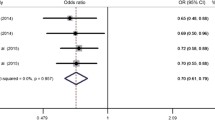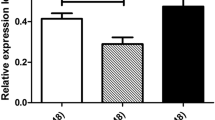Abstract
Schizophrenia (SCZ) and bipolar disorder (BD) are severe psychiatric disorders that share many genetic risk factors. This study aimed to investigate the association of phosphoinositide-3-kinase regulatory subunit1 (PIK3R1) gene rs3756668 and rs3730089 polymorphisms with SCZ and BD risks and determine the expression levels of PIK3R1. A total of 548 SCZ cases, 512 BD cases, and 598 healthy controls were included in this study. Single nucleotide polymorphisms (SNPs) were genotyped using the Sequenom MassARRAY platform, and quantitative reverse transcription polymerase chain reaction was conducted to examine the mRNA expression of PIK3R1. The genotypic distribution of rs3756668 in the BD group was significantly different from that in the healthy controls (P = 0.038). After adjustment for gender and age was made, rs3730089 was significantly associated with the risk of SCZ [AA/(AG + GG): OR = 2.25, Padj = 0.040; AA/GG: OR = 2.27, Padj = 0.038]. The SNP rs3756668 was associated with the susceptibility of BD (AA+GG/AG: OR = 0.73, P = 0.011) and the association remained after adjusting for gender and age. The mRNA level of PIK3R1 was significantly upregulated in patients with BD compared with that in the control group (P < 0.001). In terms of the diagnostic value of PIK3R1 for BD, the receiver operating characteristic curve analysis showed an area under the curve of 0.809 with 74.0% sensitivity and 73.9% specificity. PIK3R1 may be the shared susceptibility gene of SCZ and BD and may be a potential diagnostic biomarker for BD.


Similar content being viewed by others
References
Alexandrov PN, Zhao Y, Jaber V, Cong L, Lukiw WJ (2017) Deficits in the proline-rich synapse-associated Shank3 protein in multiple neuropsychiatric disorders. Front Neurol 8:670. https://doi.org/10.3389/fneur.2017.00670
Almind K, Delahaye L, Hansen T, Van Obberghen E, Pedersen O, Kahn CR (2002) Characterization of the Met326Ile variant of phosphatidylinositol 3-kinase p85alpha. Proc Natl Acad Sci U S A 99:2124–2128. https://doi.org/10.1073/pnas.042688799
Beaulieu JM, Gainetdinov RR, Caron MG (2007) The Akt-GSK-3 signaling cascade in the actions of dopamine. Trends Pharmacol Sci 28:166–172. https://doi.org/10.1016/j.tips.2007.02.006
Bowden NA, Scott RJ, Tooney PA (2008) Altered gene expression in the superior temporal gyrus in schizophrenia. BMC Genomics 9:199. https://doi.org/10.1186/1471-2164-9-199
Bresee LC, Majumdar SR, Patten SB, Johnson JA (2010) Prevalence of cardiovascular risk factors and disease in people with schizophrenia: a population-based study. Schizophr Res 117:75–82. https://doi.org/10.1016/j.schres.2009.12.016
Burghardt KJ, Seyoum B, Dass SE, Sanders E, Mallisho A, Yi Z (2018) Association of protein Kinase B (AKT) DNA hypermethylation with maintenance atypical antipsychotic treatment in patients with bipolar disorder. Pharmacotherapy 38:428–435. https://doi.org/10.1002/phar.2097
Castano-Betancourt MC et al (2016) Novel genetic variants for cartilage thickness and hip osteoarthritis. PLoS Genet 12:e1006260. https://doi.org/10.1371/journal.pgen.1006260
Chen YG (2018) Research progress in the pathogenesis of Alzheimer's disease. Chin Med J 131:1618–1624. https://doi.org/10.4103/0366-6999.235112
Chen M et al (2010) Genetic variations of the PI3K-AKT-mTOR pathway and clinical outcome in muscle invasive and metastatic bladder cancer patients. Carcinogenesis 31:1387–1391. https://doi.org/10.1093/carcin/bgq110
Chen C et al (2014) Correlation between DNA methylation and gene expression in the brains of patients with bipolar disorder and schizophrenia. Bipolar Disord 16:790–799. https://doi.org/10.1111/bdi.12255
Cross-Disorder Group of the Psychiatric Genomics C et al (2013) Genetic relationship between five psychiatric disorders estimated from genome-wide SNPs. Nat Genet 45:984–994. https://doi.org/10.1038/ng.2711
Dwivedi Y et al (2008) Lower phosphoinositide 3-kinase (PI 3-kinase) activity and differential expression levels of selective catalytic and regulatory PI 3-kinase subunit isoforms in prefrontal cortex and hippocampus of suicide subjects. Neuropsychopharmacology: official publication of the American College of Neuropsychopharmacology 33:2324–2340. https://doi.org/10.1038/sj.npp.1301641
Elkaim E et al (2016) Clinical and immunologic phenotype associated with activated phosphoinositide 3-kinase delta syndrome 2: a cohort study. J Allergy Clin Immunol 138:210–218 e219. https://doi.org/10.1016/j.jaci.2016.03.022
Emamian ES, Hall D, Birnbaum MJ, Karayiorgou M, Gogos JA (2004) Convergent evidence for impaired AKT1-GSK3beta signaling in schizophrenia. Nat Genet 36:131–137. https://doi.org/10.1038/ng1296
Engelman JA, Luo J, Cantley LC (2006) The evolution of phosphatidylinositol 3-kinases as regulators of growth and metabolism. Nat Rev Genet 7:606–619. https://doi.org/10.1038/nrg1879
Fatjo-Vilas M et al (2016) Involvement of NRN1 gene in schizophrenia-spectrum and bipolar disorders and its impact on age at onset and cognitive functioning. World J Biol Psychiat: the official journal of the World Federation of Societies of Biological Psychiatry 17:129–139. https://doi.org/10.3109/15622975.2015.1093658
Goes FS, Rongione M, Chen YC, Karchin R, Elhaik E, Bipolar Genome S, Potash JB (2011) Exonic DNA sequencing of ERBB4 in bipolar disorder. PLoS One 6:e20242. https://doi.org/10.1371/journal.pone.0020242
Guo X et al (2018) Influence of CTNNB1 rs2953 polymorphism on schizophrenia susceptibility in Chinese Han population through modifying miR-485 binding to CTNNB1. Genes Brain Behav:e12524. https://doi.org/10.1111/gbb.12524
Jauhar S et al (2017) A test of the Transdiagnostic dopamine hypothesis of psychosis using positron emission tomographic imaging in bipolar affective disorder and schizophrenia. JAMA Psychiat 74:1206–1213. https://doi.org/10.1001/jamapsychiatry.2017.2943
Karadogan AH, Arikoglu H, Gokturk F, Iscioglu F, Ipekci SH (2018) PIK3R1 gene polymorphisms are associated with type 2 diabetes and related features in the Turkish population. Adv Clin Exp Med: official organ Wroclaw Medical University. https://doi.org/10.17219/acem/68985
Khan RA et al (2016) Analysis of association between common variants in the SLCO6A1 gene with schizophrenia, bipolar disorder and major depressive disorder in the Han Chinese population. World J Biol Psychiat: the official journal of the World Federation of Societies of Biological Psychiatry 17:140–146. https://doi.org/10.3109/15622975.2015.1126676
Kolomeets NS, Orlovskaya DD, Rachmanova VI, Uranova NA (2005) Ultrastructural alterations in hippocampal mossy fiber synapses in schizophrenia: a postmortem morphometric study. Synapse 57:47–55. https://doi.org/10.1002/syn.20153
Krivosheya D et al (2008) ErbB4-neuregulin signaling modulates synapse development and dendritic arborization through distinct mechanisms. J Biol Chem 283:32944–32956. https://doi.org/10.1074/jbc.M800073200
Li L, Plummer SJ, Thompson CL, Tucker TC, Casey G (2008) Association between phosphatidylinositol 3-kinase regulatory subunit p85alpha Met326Ile genetic polymorphism and colon cancer risk. Clin Cancer Res: an official journal of the American Association for Cancer Research 14:633–637. https://doi.org/10.1158/1078-0432.CCR-07-1211
Lichtenstein P, Yip BH, Bjork C, Pawitan Y, Cannon TD, Sullivan PF, Hultman CM (2009) Common genetic determinants of schizophrenia and bipolar disorder in Swedish families: a population-based study. Lancet 373:234–239. https://doi.org/10.1016/S0140-6736(09)60072-6
Liu Y, Li Z, Zhang M, Deng Y, Yi Z, Shi T (2013) Exploring the pathogenetic association between schizophrenia and type 2 diabetes mellitus diseases based on pathway analysis. BMC Med Genet 6(Suppl 1):S17. https://doi.org/10.1186/1755-8794-6-S1-S17
Liu J, He J, Cheng M, Cao H, Zhang X (2019) Prevalence, sociodemographic, and clinical correlates of older chinese patients with deficit schizophrenia. J Geriatr Psychiatry Neurol 32:298–303. https://doi.org/10.1177/0891988719870321
Long J et al (2014) The prevalence of schizophrenia in mainland China: evidence from epidemiological surveys. Acta Psychiatr Scand 130:244–256. https://doi.org/10.1111/acps.12296
Malodobra M, Pilecka A, Gworys B, Adamiec R (2011) Single nucleotide polymorphisms within functional regions of genes implicated in insulin action and association with the insulin resistant phenotype. Mol Cell Biochem 349:187–193. https://doi.org/10.1007/s11010-010-0673-5
Martín-Peña A, Acebes A, Rodríguez J-R, Sorribes A, de Polavieja GG, Fernández-Fúnez P, Ferrús A (2006) Age-independent synaptogenesis by phosphoinositide 3 kinase. J Neurosci 26:10199–10208. https://doi.org/10.1523/JNEUROSCI.1223-06.2006
Merikangas KR et al (2011) Prevalence and correlates of bipolar spectrum disorder in the world mental health survey initiative. Arch Gen Psychiatry 68:241–251. https://doi.org/10.1001/archgenpsychiatry.2011.12
Munkholm K, Peijs L, Vinberg M, Kessing LV (2015) A composite peripheral blood gene expression measure as a potential diagnostic biomarker in bipolar disorder. Transl Psychiatry 5:e614. https://doi.org/10.1038/tp.2015.110
Nie L, Zhaom Z, Wen X, Luo W, Ju T, Ren A, Wu B, London ED, Li J (2018) Factors affecting the occurrence of psychotic symptoms in chronic methamphetamine users. J Addict Dis 37:202–210. https://doi.org/10.1080/10550887.2019.1661752
Psychiatric GCBDWG (2011) Large-scale genome-wide association analysis of bipolar disorder identifies a new susceptibility locus near ODZ4. Nat Genet 43:977–983. https://doi.org/10.1038/ng.943
Ramanan VK et al (2014) APOE and BCHE as modulators of cerebral amyloid deposition: a florbetapir PET genome-wide association study. Mol Psychiatry 19:351–357. https://doi.org/10.1038/mp.2013.19
Schizophrenia Psychiatric Genome-Wide Association Study C (2011) Genome-wide association study identifies five new schizophrenia loci. Nat Genet 43:969–976. https://doi.org/10.1038/ng.940
Shi S, Leites C, He D, Schwartz D, Moy W, Shi J, Duan J (2014) MicroRNA-9 and microRNA-326 regulate human dopamine D2 receptor expression, and the microRNA-mediated expression regulation is altered by a genetic variant. J Biol Chem 289:13434–13444. https://doi.org/10.1074/jbc.M113.535203
Smilowitz S, Aftab A, Aebi M, Levin J, Tatsuoka C, Sajatovic M (2019) Age-related differences in medication adherence, symptoms, and stigma in poorly adherent adults with bipolar disorder. J Geriatr Psychiatry Neurol:891988719874116–891988719874116. https://doi.org/10.1177/0891988719874116
Sodersten K, Palsson E, Ishima T, Funa K, Landen M, Hashimoto K, Agren H (2014) Abnormality in serum levels of mature brain-derived neurotrophic factor (BDNF) and its precursor proBDNF in mood-stabilized patients with bipolar disorder: a study of two independent cohorts. J Affect Disord 160:1–9. https://doi.org/10.1016/j.jad.2014.01.009
Strejilevich S, Szmulewicz A, Igoa A, Marengo E, Caravotta P, Martino D (2019) Episodic density, subsyndromic symptoms, and mood instability in late-life bipolar disorders: a 5-year follow-up study. Int J Geriatr Psychiatry 34:950–956. https://doi.org/10.1002/gps.5094
Teixeira AL, Colpo GD, Fries GR, Bauer IE, Selvaraj S (2018) Biomarkers for bipolar disorder: current status and challenges ahead. Expert Rev Neurother:1–15. https://doi.org/10.1080/14737175.2019.1550361
Tohda C, Nakanishi R, Kadowaki M (2006) Learning deficits and agenesis of synapses and myelinated axons in phosphoinositide-3 kinase-deficient mice. Neuro-Signals 15:293–306. https://doi.org/10.1159/000108936
Wang LE et al (2012) Roles of genetic variants in the PI3K and RAS/RAF pathways in susceptibility to endometrial cancer and clinical outcomes. J Cancer Res Clin Oncol 138:377–385. https://doi.org/10.1007/s00432-011-1103-0
Wen Z et al (2016a) Genetic association between NRG1 and schizophrenia, major depressive disorder, bipolar disorder in Han Chinese population. Am J Med Genet B Neuropsychiatr Genet: the official publication of the International Society of Psychiatric Genetics 171B:468–478. https://doi.org/10.1002/ajmg.b.32428
Wen Z et al (2016b) Polymorphisms in NRGN are associated with schizophrenia, major depressive disorder and bipolar disorder in the Han Chinese population. J Affect Disord 194:180–187. https://doi.org/10.1016/j.jad.2016.01.034
Winnay JN, Kahn CR (2011) PI 3-kinase regulatory subunits as regulators of the unfolded protein response. Methods Enzymol 490:147–158. https://doi.org/10.1016/B978-0-12-385114-7.00009-X
Yamada T et al (2017) Resting-state functional connectivity-based biomarkers and functional MRI-based Neurofeedback for psychiatric disorders: a challenge for developing theranostic biomarkers. Int J Neuropsychopharmacol 20:769–781. https://doi.org/10.1093/ijnp/pyx059
Zhu S et al (2017) Genetic disruption of ankyrin-G in adult mouse forebrain causes cortical synapse alteration and behavior reminiscent of bipolar disorder. Proc Natl Acad Sci U S A 114:10479–10484. https://doi.org/10.1073/pnas.1700689114
Acknowledgements
The present study was supported by the National Natural Science Foundation of China (No. 81460518), Youth Fund Project of Guangxi Natural Science Foundation (NO. 2017GXNSFBA198070), Youth Fund Project of National Natural Science Foundation of China (NO. 81703290).
Author information
Authors and Affiliations
Corresponding author
Ethics declarations
Conflict of interest
The authors declare there are no financial and other conflicts of interests.
Ethical approval
All procedures performed in studies involving human participants were in accordance with the ethical standards of the Ethics Committee of the Guangxi University of Chinese Medicine and with the 1964 Helsinki declaration and its later amendments or comparable ethical standards. Informed consent were written by all participants in cases and healthy controls groups.
Additional information
Publisher’s note
Springer Nature remains neutral with regard to jurisdictional claims in published maps and institutional affiliations.
Jiao Huang, Zhaoxia Chen and Lulu Zhu are first co-author
Electronic supplementary material
ESM 1
(PDF 165 kb)
Rights and permissions
About this article
Cite this article
Huang, J., Chen, Z., Zhu, L. et al. Phosphoinositide-3-kinase regulatory subunit 1 gene polymorphisms are associated with schizophrenia and bipolar disorder in the Han Chinese population. Metab Brain Dis 35, 785–792 (2020). https://doi.org/10.1007/s11011-020-00552-z
Received:
Accepted:
Published:
Issue Date:
DOI: https://doi.org/10.1007/s11011-020-00552-z




